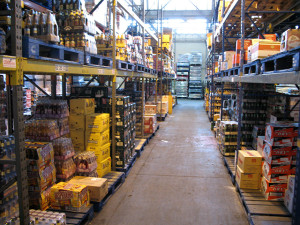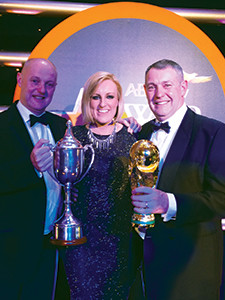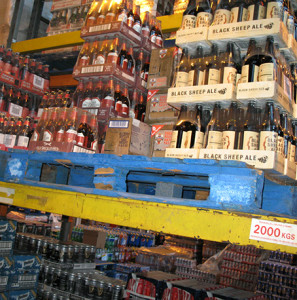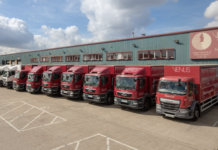Tan Parsons talks to the alcohol wholesaler about plans for expansion.
Wilds offers the care and personal touch that you might expect of a good family business. But these are more than just a mission statement on a wall-plaque. The company’s approach to service is critical to its growth plans – particularly with wine, which currently makes up 9% of turnover (just over £800,000). The next target is to grow this to £1m.
In the on-trade, wine offers good margins and consumers are growing in confidence about which bottles to choose in restaurants. Andrew Wild, joint MD with brother Steven, says: “What I want to achieve with wine is once we get a wine listed somewhere, I want them to feel that they can’t buy it from anywhere else because we’re so bloody good at it, with the level of service that we can currently offer because we’re small and on the ball. I want to get to the stage where they ask, ‘How the hell did we manage without Wilds?’”
A key player in their plans is wine development manager Helen Cooling, who offers their customers advice, tastings, menu design and staff training.
“I go in, meet them and talk to them about what works for them,” she says. “I design a wine menu, ask if there’s anything else they’re looking for and then we come back with something bespoke to them. A lot of people want that point of difference.”
 It’s the same with soft drinks, with many operators choosing premium products such as Fentimans: “They know to survive in the market, they’ve got to be doing something a little bit better and a little bit different.”
It’s the same with soft drinks, with many operators choosing premium products such as Fentimans: “They know to survive in the market, they’ve got to be doing something a little bit better and a little bit different.”
Wilds has more than 600 wines – it’s a member of the Society of Vintners, and no two of its wine lists are the same. This tailored service is creating a selling point and making the wholesaler stand out.
Allied with this, Wilds is a longstanding member of the Today’s Group – something Wild says has been great and opens doors with suppliers.
He says the other key growth driver for the company is cask or real ale: “What the CAMRA boys like.” It’s a type of beer that requires a bit of love and selling it relies on having customers who know how to handle the product: unlike mainstream lager, which can be served almost immediately from the keg, real ale requires “a bit of nurturing”, needing to be tapped, vented and left to settle for a day, so “you have to think two days ahead, rather than two minutes,” says Wild.
By and large, the pubs serving cask ale as their chief bitter are doing very well. Wilds’ customers include free pubs, restaurants, sports clubs and hotels – basically, anywhere with a bar within 40 miles of the depot.
The only places off limits are those tied to the pub groups. But with beer ties set to change, Wilds and other wholesalers could find themselves with a big new chunk of the market to aim at. This will bring both opportunities and threats. “If it comes out as everyone thinks it will, the whole market will open up so that naturally will give us a lot of other opportunities.”
But Wild fears it could also usher in an army of “vagabonds and rogues” selling duty-avoided booze out of unmarked white vans.

Wilds was crowned 2013’s Best Wholesaler of The Year by AB InBev, scooping the prize ahead of national operators. This success was in part down to spotting market trends.
Today, pubs and restaurants are increasingly looking for something to set them apart from competitors, says Wild. This goes across ale, lager, wine and spirits, so while the big brands remain core sellers for Wilds, the value of premium niche products is growing.
“Bars are now looking for BrewDog in bottles, Beavertown and all these sorts of things – not on the same scale as the biggest brands, but they are looking for craft beer in a bottle behind the bar.”
This is reflected in the recent explosion in the number of Wilds’ SKUs – now nearly 3,000. “If you look at what our customers are buying compared to five years ago, one or two are introducing cask ale again, having initially taken it out in the last century. They are looking for brands on their bar that are not Carling, Carlsberg and Foster’s. They want something different. They want their own unique selling point.”
It’s the same with spirits – while Smirnoff and Vladivar would have accounted for more than 90% of Wilds’ vodka sales five years ago, today there are premium brands such as Grey Goose and long lists of vodkas that are high in price and have an image of “cutting edginess”.
“Smirnoff is now almost a supermarket brand,” says Wild. “We still sell masses of Smirnoff but these other brands are just growing and growing. And they will continue to, I think.”
Many on-trade outlets are now selling cocktails and mixed drinks too, something of which Wilds is taking advantage: “There’s whole ranges of products like syrups that you put in these drinks. We’re selling loads of those, whereas 10 years ago we wouldn’t have sold a single one.”
 This year, Wilds is celebrating its 21st birthday and it remains a true family business – Wild’s wife Annie runs logistics and telesales, and Steven’s wife Sarah looks after accounts payable and wages; Wild’s daughter Rachel is also a full-time employee. In reaching this anniversary, the team decided to change the name from Wilds of Oldham to Wilds Premier Drinks Distributor. Wild is Oldham born and bred and proud of it, but with ambitious growth plans and Manchester city centre a prime target, it made sense to tweak the branding.
This year, Wilds is celebrating its 21st birthday and it remains a true family business – Wild’s wife Annie runs logistics and telesales, and Steven’s wife Sarah looks after accounts payable and wages; Wild’s daughter Rachel is also a full-time employee. In reaching this anniversary, the team decided to change the name from Wilds of Oldham to Wilds Premier Drinks Distributor. Wild is Oldham born and bred and proud of it, but with ambitious growth plans and Manchester city centre a prime target, it made sense to tweak the branding.
With plans to grow their’ geographical reach, one opportunity is to bring in bigger vans so that drivers only have to go out once – Wilds’ vans are typically Transits and currently do three or four runs a day. It will be a challenge to maintain customer satisfaction levels with this change so there is a balance to be struck.
The other great opportunity is with online ordering. Wilds takes technology seriously and has a presence on Facebook and Twitter. It also uses its website to communicate useful information to customers, such as the upcoming duty price changes.
With national operators leading the way, Wild wants Wilds to be selling online by May 2016.





